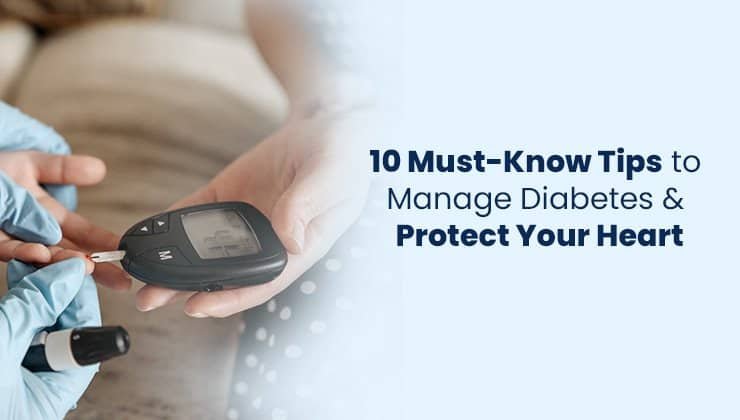Introduction
Diabetes and heart disease are two of the most common and serious health conditions that affect millions of people worldwide. People with diabetes are at a higher risk of developing heart disease. So, managing diabetes effectively is important for protecting heart health.
In this blog post, we will explore the connection between diabetes and heart disease, along with tips for managing diabetes to prevent heart disease.
Understanding Diabetes And Heart Health
Diabetes and heart disease are closely related, with diabetes significantly increasing the risk of developing cardiovascular problems.
High blood sugar levels may damage blood vessels and nerves that control the heart over time. It may increase the likelihood of heart conditions, including coronary artery disease, heart attack, and stroke.
People with diabetes often have other conditions, including high blood pressure and high LDL cholesterol levels, that may increase the risk of heart disease.
Also, people with diabetes may have heart failure, where the heart can’t pump blood effectively.
So, managing diabetes effectively may help in controlling the blood glucose levels and also protect the heart and prevent serious complications.
Managing Diabetes And Heart Health
Here are a few tips for managing diabetes and preventing heart disease:
- Monitor blood sugar levels regularly
Controlling blood sugar levels is key to preventing heart disease with diabetes. Irregular blood sugar levels over time may damage blood vessels, increase inflammation, and raise the risk of heart attacks, stroke, and other cardiovascular complications.
So, regular monitoring and adherence to prescribed medications along with a balanced diet are essential for managing diabetes and safeguarding heart health.
- Follow a Heart-healthy Diet
A balanced, heart-healthy diet is essential for managing diabetes and reducing the risk of heart disease. It helps control blood sugar, lower cholesterol, reduce blood pressure, and support overall cardiovascular health.
The key dietary habits to follow are
- Incorporate plenty of fresh fruits and vegetables.
- Include protein foods, including lean foods, poultry, seafood, beans, and nuts
- Incorporate whole grains, including oats, brown rice, quinoa, and whole wheat, over refined grains.
- Be mindful of portion size
- Limit added sugars, saturated fat, and foods rich in sodium
You may track the foods you eat and how they affect your glucose levels. Regular blood sugar checks before and after meals may help in making informed dietary choices.
- Stay Physically Active
Physical activity and weight management may help in controlling diabetes and reducing the risk of heart disease.
It is recommended that at least 150 minutes per week of moderate intensity aerobic physical activity or 75 minutes per week of vigorous intensity aerobic activity be performed for healthy adults.
It is preferable to begin with short walks and gradually increase duration and intensity. Always consult your healthcare professional before starting a new exercise routine, especially if you have diabetes-related complications or a history of heart issues.
- Manage Cholesterol Levels
High cholesterol levels may clog arteries, reduce blood flow and increase the risk of heart disease, including stroke and heart attack. It may also contribute to the development and worsening of diabetic complications.
If you have high cholesterol levels, a combination of medicines and lifestyle changes may help reduce the risk of heart disease. Regular monitoring of cholesterol levels is essential for early detection and intervention.
- Keep Blood Pressure Under Control
High blood pressure is a major risk factor for heart disease and may worsen complications in people with diabetes. Maintaining blood pressure within a healthy range helps protect the heart, kidneys, and other vital organs.
To keep blood pressure under control, follow a low-sodium, heart-healthy diet, exercise regularly, and take prescribed medications consistently.
- Quit Smoking
Smoking has been shown to have several health effects, including decreasing the good cholesterol, raising blood pressure, increasing the risk of blood clots, and making physical activity more difficult. Research has shown that smokers are more likely to develop diabetes compared to non-smokers.
Quitting smoking may help improve overall health and reverse some of the damage. You may speak to your healthcare provider about nicotine replacement therapies, medications, or support groups to help you quit smoking successfully.
- Limit Alcohol Intake
Drinking too much alcohol, especially if you have diabetes, may lead to nerve damage, raise blood pressure, and cause fluctuations in blood glucose levels. These effects may increase the risk of heart disease and other diabetes-related complications.
Always consult your healthcare professional about whether alcohol is safe for you, especially if you take insulin or medications that lower blood sugar levels.
- Manage Stress Effectively
Chronic stress may negatively impact both diabetes management and heart health. It affects people and impacts well-being, diminishes energy levels, and interrupts sleep. It may also cause different pains and trigger overeating, drinking too much alcohol, and smoking.
Learning to manage stress using deep breathing or meditation, regular physical activity, and listening to music may help improve physical and emotional well-being. You may talk to a mental health professional if needed to better control the blood sugar level and support heart health.
- Adhere to Medications
Taking prescribed medications consistently is vital for managing risk factors of both diabetes and heart disease, including high blood pressure, high cholesterol, and blood sugar levels. Your healthcare professional may adjust the medicines if the blood sugar stays too high.
Adherence to medications combined with lifestyle changes greatly improves the chances of maintaining heart health. Always talk to your healthcare professional before trying new medicines.
- Go for Regular Medical Check-ups
Regular check-ups with your healthcare professional may help in monitoring the blood sugar, blood pressure, and cholesterol levels, which are the key factors that influence diabetes and heart health. As diabetes may silently damage blood vessels and organs, early detection may help in preventing complications.
It may also help in detecting early signs of heart disease, nerve damage, or other diabetes-related issues. The healthcare provider may adjust medications and the lifestyle plan as needed to keep on track.
Conclusion
Management of diabetes is essential not only for blood sugar control but also for protecting your heart. A combination of healthy eating, regular exercise, adherence to medications, and lifestyle changes may significantly reduce the risk of heart disease and manage diabetes.
Our expert team at Heart360 Care provides personalised guidance, advanced diagnostics, and ongoing support tailored to your heart health needs. If you have any heart-related issues, you may book a consultation with Dr Nikhil P J Thekumparampil for expert guidance!
Frequently Asked Questions
Yes, exercise is safe for diabetics with heart problems when done under medical supervision. You may start with low-impact activities, including walking or cycling and gradually increase the intensity of the exercise. Avoid strenuous or unsupervised high-intensity workouts. Immediately stop workouts if you feel chest pain, dizziness, or shortness of breath.
To prevent heart disease in diabetics, manage blood sugar, blood pressure, and cholesterol through a balanced diet, regular exercise, and prescribed medications. Also, quit smoking, limit alcohol intake, reduce stress, and maintain a healthy weight. Regular check-ups and early detection of risk factors may help in protecting heart health.
High blood sugar levels over time may damage the blood vessels and nerves that control the heart. People with diabetes may develop conditions, including high blood pressure and high LDL cholesterol levels, that may promote the buildup of plaque in arteries leading to heart attacks, stroke, or heart failure.
The best diet for managing diabetes and heart health is a diet rich in fruits, vegetables, whole grains, lean proteins, and healthy fats, including nuts and olive oil. Limit added sugars, refined carbohydrates, salt, and saturated fats. Practice balanced meals and portion control to stabilize blood sugar and support heart health.









